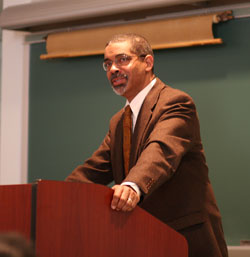 Stephen Carter, William Nelson Cromwell Professor of Law at Yale University, delivered a lecture Friday titled "The Right to Religious Nurture." Carter, one of the most distinguished law professors in America, was the recipient of the 2008 Senior Peck Medal. Wabash President Patrick White presented the Senior Peck Medal to Carter later in the evening at the 35th Annual David W. Peck Awards Banquet. Click here and here to view photos from the banquet.
Stephen Carter, William Nelson Cromwell Professor of Law at Yale University, delivered a lecture Friday titled "The Right to Religious Nurture." Carter, one of the most distinguished law professors in America, was the recipient of the 2008 Senior Peck Medal. Wabash President Patrick White presented the Senior Peck Medal to Carter later in the evening at the 35th Annual David W. Peck Awards Banquet. Click here and here to view photos from the banquet.
The Peck Medal honors the late David W. Peck ’22, a Harvard law graduate and New York attorney who was chief justice of the New York Appellate Court and a long-time member of the Wabash Board of Trustees.
In his lecture Carter spoke about preserving an important American tradition – separation of church and state. He began with a story about then Senator Hubert Humphrey who was seeking the vice-presidential nomination under Lyndon B. Johnson and Fannie Lou Hamer, a civil rights leader.
Carter explained Humphrey was a practical politician and Hamer spoke of the will of God. "It is not that [practical politics] and [religion] have nothing to do with one another," he said. "They deeply overlap. Most practical politicians, in the end, cannot simply do what they believe is the will of God."
"Put aside theology, I believe in the point of view of democracy and democratic theory that democracy needs radical, energetic dissent. Democracy needs people of radically different points of view to come together and argue about, worry about, talk about, and negotiate about the best answers to this or that problem."
Carter gave many examples through history of religiously faithful demanding changes in politics such as the civil rights movement, the women’s suffrage movement, and the early progressive movement.
"The purpose of the role of separation was entirely to protect the ability of the religious to nurture meaning among themselves without the interference of the larger society in which they were in imbedded – except in time of emergency.
"The cleanest way to look at the separation of church and state then is the separation of church and state protects the church from the state and prohibits the state from interfering in the realm of the church except for times of emergency."
He concluded his lecture to a packed room talking about the "heart of democracy."
"What makes a democracy a democracy is our willingness to look at our fellow citizens, including those with which we have sharp disagreements, as co-equal citizens worth listening to as well as talking to."